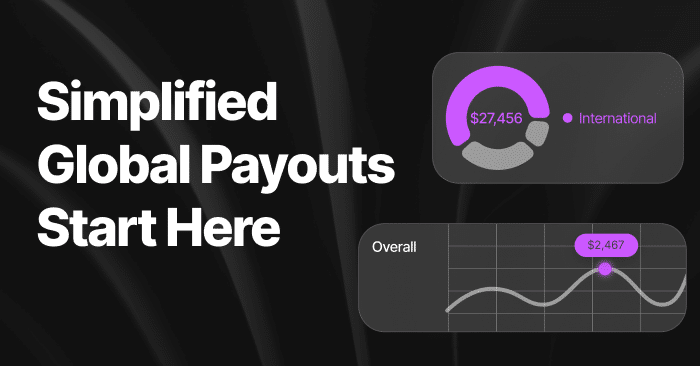
Send payments to partners, freelancers, and vendors in 200+ countries—without the complexity.
Established in 1998, PayPal now boasts over 426 million users and generated $25.3 billion in revenue last year. It’s an incredibly competitive brand in almost every type of payments market to date. This includes the mass payment feature, which companies of every size take advantage of to ensure partners, vendors, affiliates, and other entities get paid on time, at the same time.
In this article, we’ll explore what mass payments PayPal can help you send, how to make a mass payment, other alternatives to PayPal, and how to decide which solution fits your business best.
What is a Mass Pay Payment on PayPal?
How does PayPal work? When it comes to mass payments, the PayPal mass pay option is called Payouts. This feature allows a business to send money to multiple vendors or partners at the same time; where they receive the funds in their own PayPal or Venmo account. The amount is then reflected in the recipient’s account balance.
Ways to Send Mass Payment via PayPal
A business can choose from three different ways to send a mass payout. These are:
- Use Payouts Web
- Integrate directly with the Payouts API
- Manually upload the payment file via SFTP
But first, make sure that Mass Payments is enabled in your PayPal account. Here’s how to ensure that:
- Log into your PayPal dashboard
- Navigate to “Tools”
- Click the “Send Payment” button
- Click “Make a mass payment” option from the “Send Payment” page
- Follow remaining instructions
Mass Payment Currencies on PayPal
The mass payments PayPal offers can be sent in a variety of currencies, even if you don’t maintain a balance in that currency. These currencies include:
- USD
- CAD
- EUR
- AUD
- MXN
- GBP
The Payouts PayPal payments feature also allows a business to conveniently track all mass payments (as if they were individual payments). Your entire payout history is available online and can be downloaded in a report with transaction details, at any time.
Mass Payment PayPal Fees
The cost to send mass payments through Payouts is 2% across the board. This includes:
- Domestic Payouts
- International Payouts (in Euros or Swedish krona) in the European Economic Area (EEA)
- International Payouts outside of the EEA
This 2% fee is not to exceed PayPal’s maximum fee cap for each currency.
How to Set Up Mass Payments
Receiving a mass payment money transfer through PayPal is simple. To be eligible for Payout payments, you just need to possess a PayPal account or a Venmo account (available to US customers only).
Before a business can send a mass PayPal payment, you must have a PayPal Business account and upload a spreadsheet containing all the necessary information for your recipients. The file (typically created in Excel) must contain the following payment data:
- Contact data for each recipient (name, email, phone number, payer ID)
- Payment amount (separated by each recipient)
- The 3-digit currency code (only one currency per payout)
- Note or reason for the payout
Once the information has been collected, here is how you complete the process:
- Click the “Pay and Get Paid” tab at the top-right corner of the site
- Find the “Make Payments” payment option
- Click “Send Money”
- Select “My payment recipients are identified by”
- Upload your payment spreadsheet
- Review the information
- Click “Send Money”
Pros and Cons of PayPal as a Mass Payments Solution
When it comes to the pros and cons of PayPal, everyone has an opinion. Depending on the size of your company and industry, different features will complement your business differently. In the context of mass payments, here are some of the more common pros and cons of PayPal mass payments:
Pros of PayPal Mass Payments
Save Time and Resources
PayPal makes it quick and easy to send mass payments. Whether you’re sending commissions, rebates, incentives, or more, Payouts can help a business better streamline operations. Users can simply upload a file or integrate with RESTful payout APIs. The PayPal Payouts feature supports 24 currencies in 180 markets across the globe.
Cheaper Overall Fees
Since PayPal offers a wide range of services, its pricing structure is diverse. Smaller businesses have the option to only pay for features they use, and at the level they need them. This is a great advantage when looking at overall costs for PayPal mass payments vs. the alternatives.
Seamless Integration with Business Software
Paypal seamlessly integrates with a multitude of business software solutions, from web design to ecommerce site builders and marketing automation. This gives organizations access to a wider selection of solutions to choose from, regardless of their budget.
In some cases, PayPal offers discounts if you sign up with their preferred partners through the system. They also have an impressive selection of software development kits for small business owners and developers.
Extra Merchant Support Features
In addition to the Payouts feature, companies can reap the benefits of a variety of extra services that will help streamline processes and pay partners faster. These solutions are easily scalable, can fit within any budget, and include:
- Marketing: PayPal business accounts include tools to create customized incentives at no additional cost.
- Tax computations: Set up PayPal to calculate taxes for every transaction. You can also send form 1099-K to users and track payment volumes.
- Recordkeeping: PayPal keeps extensive records and even offers e-invoicing features.
- Shipping: PayPal Business Account users get USPS and UPS shipping discounts, while the system helps to track and confirm the arrival of packages.
The PayPal resource center offers business account holders the opportunity to integrate with a wide range of business services.
Cons of PayPal Mass Payments
Popular Target for Fraud
Since PayPal has been around so long, it remains a highly popular target for phishing scams. According to a recent study, PayPal experienced a 305% increase in fraud in the first half of 2022. The sensitive information inherent to the platform makes it attractive to phishers. Although PayPal has some of the most up-to-date security measures in place, business owners should still educate themselves on the latest scams to avoid being phished.
Customer Service Needs Work
As with any business that grows large, customer service departments can often get left to the wayside, or worse, relegated to an automated call center. Most of the negative feedback online about PayPal is the customer service; varying from lack of support for fraudulent transactions to slow response times over account holds and fund freezes.
Frozen or Delayed Funds
Any dispute raised by a buyer or seller can result in account restrictions, including frozen accounts and delayed refunds. To avoid this hassle, companies should keep in constant contact with partners to ensure misunderstandings are resolved before reaching PayPal’s dispute center.
No High-Risk Business
PayPal is incompatible with high-risk businesses and does not support age verification tools. This makes it impossible for any business selling age-restricted products to open a PayPal Business Account.
Mass Payment Alternatives to PayPal
When it comes to top PayPal alternatives for mass payment, there are a few leaders in the market. Here are four of them:
1. Tipalti
Tipalti gives an organization enterprise-grade financial controls and allows you to pay thousands of partners in a matter of clicks. Tipalti’s mass payouts happen in 120 currencies and 200+ countries, using 26,000 rules to reduce payment errors by 66%. The platform is architected to send thousands of payments at scale, with minimal effort, using global and US ACH, wire transfers, BACS, SEPA, PayPal, and more.
How to Send Mass Payments with Tipalti
Mass payment execution is made easy, triggering payments from invoices, payment file upload, or the Tipalti API. Data entry across multiple bank portals, with costly overhead and fees, is no longer necessary. Payments can be scheduled using different methods, currencies, and countries, all from a single application. Then, all payment status and data from each method is reconciled, normalized, and can be sent to an ERP.
Automate mass payments to 200+ countries in 120 currencies with built-in compliance, flexible payout options, and real-time tracking.
See what our customers are saying
2. Payoneer
Payoneer boasts a feature called Enterprise 360° for cross-border mass payments to payees in over 200 countries/territories and 150+ currencies. Payoneer makes it much easier for companies to pay and receive mass payments via local bank transfers. Mass payouts are API enabled, so a user can integrate directly with their own platform.
How to Send Mass Payments with Payoneer
Link Payees: Either embed the Payoneer signup iframe into the payments page of your website or send users a signup link from within the Payoneer mass payout admin area. All linked users will show up as payees in your Payoneer mass payout account.
Fund the Account: Send the total amount you wish to pay to one of Payoneer’s trusted bank accounts. The balance will be updated within a day.
Pay the People: Payees decide how to withdraw funds. They can do it to a local bank account, Payoneer account, or prepaid Payoneer MasterCard.
3. Dwolla
Dwolla allows a business to make up to 5,000 mass payouts in just minutes, sending multiple bank transfers with just one API request. Decrease operational costs with standard or expedited transfer times through Dwolla’s API, and only incur one debit to fund the entire batch. The mass payment feature streamlines the entire mass payment process with a few clicks.
How to Send Mass Payments with Dwolla
Sign up for an account and then you can use Dwolla’s mass payment feature to initiate thousands of real-time payments at the same time. Their approach offers a marked advantage over repeatedly calling the same transfer API endpoint for each individual transaction. You incur only a single debit, despite thousands of transactions.
To start testing Dwolla’s mass payment feature, you can use their sandbox environment for free.
4. Veem
Veem helps a business save time and send a high volume of payments at once, all from a single file; in just a few clicks. Veem’s Mass Pay feature charges zero additional fees for fast and reliable batch processing. Get transparent payment tracking and reporting, to over 100 countries, in just a few clicks. Veem also offers live, 24/7 customer support via chat, email, or phone.
How to Send Mass Payments with Veem
Follow these steps to send money through Veem’s Mass Pay:
- Click “Send”
- Log into your Veem account
- Click on “Mass Pay”
- Use a simple CSV template to input payments
- Schedule desired processing date
- Upload the payment file
- Check over all information
Transform Your Workflow with Tipalti
Automate every step of your payout workflow and deliver a frictionless experience to your recipients—all from one platform.


Is PayPal the Right Mass Payment Solution for Your Business?
For mass payment PayPal has always been a top choice. However, as the list shows above, there are other global mass payment solutions that give the brand a run for its money. You need to look at factors that will influence the decision, such as business size, volume of mass payments (some platforms have a limit), amount, and whether you are sending domestic, international, or both.
Therefore, the first step to knowing which mass payment solution fits best is having a thorough understanding of your top business mass pay needs. Overall, PayPal has thought of just about everything when it comes to sending mass payments to multiple beneficiaries. You can weigh the PayPal pros and cons yourself, and decide if it’s a platform that best aligns with your mass payment strategies.
Why Tipalti Is the #1 Alternative
Scalable Global Mass Payouts Platform
Manage and automate global payments to 200+ countries in 120 currencies with advanced funding options, FX capabilities, and multi-entity support, all within a single secure platform connected to major banks and payment methods like PayPal.
Branded Self-Service Payee Experience
Provide a fully branded, multilingual self-service payee experience with guided tax form collection, preferred payment method selection, real-time payment tracking, and digital self-billing, streamlining onboarding while reducing support volume.
Integrated Tax Compliance and Risk Controls
Built-in compliance features include KPMG-approved tax validation, AML and OFAC screening, DAC7 and VAT support, secure data handling, and enterprise-grade controls to reduce fraud and risk exposure.
Seamless Integrations
Effortlessly integrate using a branded portal, embeddable iframe, and flexible APIs. Customize the experience with AI-assisted branding tools, and connect to leading ERPs and third-party platforms using robust developer resources and pre-built integrations.

